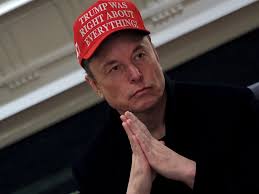
Elon Musk Announces Exit from Trump Administration

 :
| Updated On: 29-May-2025 @ 12:37 pm
:
| Updated On: 29-May-2025 @ 12:37 pmSHARE
Tech billionaire Elon Musk has announced his departure from the administration of U.S. President Donald Trump, where he had been leading the Department of Government Efficiency (DOGE), a project aimed at cutting federal government costs. Musk shared his gratitude to President Trump on the social media platform X, acknowledging the opportunity to reduce wasteful spending. He emphasized that the mission of DOGE would continue to strengthen as it becomes ingrained in government operations.
An unnamed White House official confirmed Musk’s exit to Reuters and the Associated Press. Musk joined the Trump administration in January with a bold promise to slash at least $1 trillion from the federal budget. However, DOGE’s website indicates that only about $175 billion in savings had been achieved, roughly $1,089 per taxpayer.
Musk’s departure aligns with the 130-day maximum tenure allowed for special government employees. The White House assured that efforts to cut federal spending and restructure government operations under DOGE would continue despite Musk leaving.
The relationship between Musk and Trump reportedly cooled last year after Musk invested nearly $300 million in Trump’s presidential campaign. More recently, Musk voiced public concerns about Trump’s “big, beautiful bill,” a sweeping 1,000-page legislation designed to extend the 2017 tax cuts but also add work requirements for food assistance and Medicaid. Musk criticized the bill for increasing the federal deficit rather than decreasing it, undermining the cost-cutting efforts of his DOGE team.
The legislation also allocates funds for Trump’s controversial projects, such as building a border wall between the U.S. and Mexico and increasing budgets for Immigration and Customs Enforcement. Passed by the House of Representatives, the bill is set for Senate consideration next. According to the Congressional Budget Office, if enacted in its current form, the bill could increase the U.S. deficit by $3.9 trillion by 2034, negating DOGE’s progress.
Musk expressed skepticism about the bill’s merits, saying, “I think a bill can be big, or it can be beautiful, but I don’t know if it can be both.” When asked about Musk’s criticisms, Trump said negotiations on the bill were ongoing, expressing mixed feelings about various parts of the legislation.
While Trump has avoided direct criticism of Musk, reports have surfaced about tensions between Musk and Trump administration officials, including Secretary of State Marco Rubio. Politico reported that discussions about Musk’s exit began as early as April following clashes with senior White House personnel.
Some of Musk’s DOGE-driven budget cuts have also alienated voters, especially in swing states. Earlier this year, Musk unsuccessfully supported a conservative candidate in Wisconsin’s Supreme Court race despite spending $20 million. An April poll from The Washington Post and ABC News revealed Musk’s approval rating with the Trump administration stood at just 35 percent.
Facing growing public scrutiny and declining political influence, Musk announced earlier this month plans to scale back his political spending and refocus on his business ventures. Tesla recently experienced its worst financial quarter since 2022.
Musk shared on his X platform that he would devote his time to his companies, stating: “Back to spending 24/7 at work and sleeping in conference/server/factory rooms. I must be super focused on X/xAI and Tesla (plus Starship launch next week), as we have critical technologies rolling out.”
In summary, Musk’s exit marks the end of his ambitious but contentious tenure in the Trump administration, highlighting the challenges of government reform, political alliances, and balancing business interests with public service.
Contact Us
House. No. : 163, Second Floor Haridev Rd, near Puberun Path, Hatigaon,Guwahati, Assam 781038.
E-mail : assaminkcontact@gmail.com
Contact : +91 8811887662
Enquiry
×
Reporter Login
×